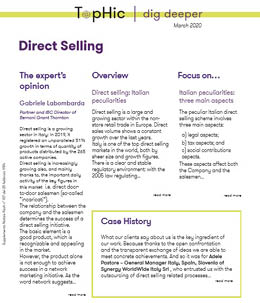-
Transactional advisory services
Find out more about the transactional advisory services of Grant Thornton Financial Advisory Services
-
Valuations
Find out more about the valuations services of Grant Thornton Financial Advisory Services
-
Mergers and acquisitions
Find out more about the merger and acquisition services of Grant Thornton Financial Advisory Services
-
Forensic and investigation services
Find out more about the forensic and investigation services of Grant Thornton Financial Advisory Services
-
Recovery & reorganisation
Find out more about the Recovery & reorganisation services of Grant Thornton Financial Advisory Services
-
Business risk services
Find out more about the business risk services of Grant Thornton Financial Advisory Services
-
Business consulting
Find out more about the business consulting services of Grant Thornton Financial Advisory Services
-
Capital market
Capital market
-
Corporate and business tax
Find out more about our corporate and business tax services.
-
Direct international tax
Find out more about our direct international tax services.
-
Global mobility services
Find out more about our global mobility services.
-
Indirect international tax
Find out more about our indirect international tax services.
-
Transfer pricing
Find out more about our transfer pricing services.
-
Litigation
Our lawyers and accountants can manage all defense measures provided not only by the Italian law, but also by EU regulations and conventions
-
Family business
Find out more about our Family business services.
-
Legal
The client can be assisted in every need and with the same care both on important operations or disputes and on simple matters

-
Back office outsourcing
Find out more about our Back office outsourcing services
-
Business process outsourcing
Find out more about our business process outsourcing services.
-
Compilation of financial statements
Find out more about our compilation of financial statements services.
-
Tax compliance
Find out more about our tax compliance services.
-
Electronic invoicing
Find out more about our electronic invoicing services
-
Electronic storage
Electronic storage is an archiving procedure that guarantees the legal validity of a digitally stored electronic document
-
Revaluation of corporate assets
Find out your civil and fiscal revaluation of tangible, intangible and financial assets
-
Payroll
Complete and customized payroll service, integrated with digital solutions and compliant with Italian and international regulations.
-
Labor consultancy
We help Italian and international companies manage all aspects of their workforce.
-
HR & Payroll Advisory Services
We review contracts, payroll, and risks for extraordinary transactions and we assess tax, labor, and safety risks in outsourcing contracts.
-
Extended services
We provide integrated digital tools to simplify HR management.
-
HR Infinity Portal
The HR Infinity Portal is Zucchetti’s platform designed to centralize communication between the company and its employees.
-
Cybersecurity
GT Digital helps clients structure information security management internal functions, also through partially or totally outsourced functions
-
Agile and Programme Management
GT Digital provides support in the adoption and implementation of different portfolio management
-
Robotic Process Automation
Our “BOT Farm” can rely on digital workers able to help clients in routine activities, allowing employees to deal with more added-value activities
-
Data strategy and management
GT Digital can support clients in seizing the opportunities offered by Big Data, from the definition of strategies to the implementation of systems
-
Enterprise Resource Planning
We support clients in selecting the most appropriate ERP System according to their specific needs, helping them also understand licensing models
-
IT strategy
GT Digital supports clients in making strategic choices, identifying innovation opportunities, comparing themselves with competitors
-
IT service management
We can support with software selection and with the implementation of dedicated tools for the management of ICT processes
-
DORA and NIS 2
The entry into force of the DORA Regulation and NIS2 represents a major step towards the creation of a harmonised regulatory framework
Direct selling is a large and growing sector within the non-store retail trade in Europe. Direct sales volume shows a constant growth over the last years. Italy is one of the top direct selling markets in the world, both by sheer size and growth figures.
There is a clear and stable regulatory environment: with the 2005 law regulating direct selling (Legge 173 dated August 17, 2005) with a special contract for intermediaries, income taxes are levied at source. There is also an income threshold clearly stating the difference between occasional and professional intermediaries and there are severe provisions against pyramid schemes, as well as against ungrounded Health Claims. Understanding different regulations is important, but understanding the style of communication in each country is important too.
The most successful companies are the ones who actually adapt to the local environment and culture and do their homework before they set up their local operations. The purpose of this memorandum is to provide a short summary to the most relevant provisions which characterize the Italian Direct Selling Market, in particular with regard to the key role played by the Italian “incaricato alla vendita diretta a domicilio”.
As a matter of fact, due to the Italian legislation and the benefited schemes it provides, distributors in Italy are not “direct sellers” but are called “demonstrators”, a peculiar kind of intermediary. The Italian term for this is “incaricato”, according to Italian direct selling law. In particular, an Italian incaricato is an intermediary, who is not purchasing a product for re-selling but, on the contrary, he introduces the selling company to a consumer and gains an intermediation commission for the introduction.
This system, based on a single sale rather than two sales, makes Italy different from many other countries.
Background
Note that a pure distributive scheme, like the traditional one above, can be legally put in place in Italy. Given no special regimes are set forth for distribution, though, that scheme would significantly affect the net income of the distributor, as ordinary taxes (much higher) and personal (expensive) formalities would apply. For this reason, the direct selling industry in Italy is almost entirely working with the Italian benefited scheme for salesmen.
Sales scheme
Traditional direct selling

Income for the affiliate is a distribution margin (e.g. wholesale price is 80$, Retail price is 100$: distribution margin is 100$ - 80$ = 20$).
Italian direct selling

Income for the affiliate is an intermediation fee (e.g. he charges a commission fee of 20$ for intermediating the sale of a product sold at retail price of 100$).

